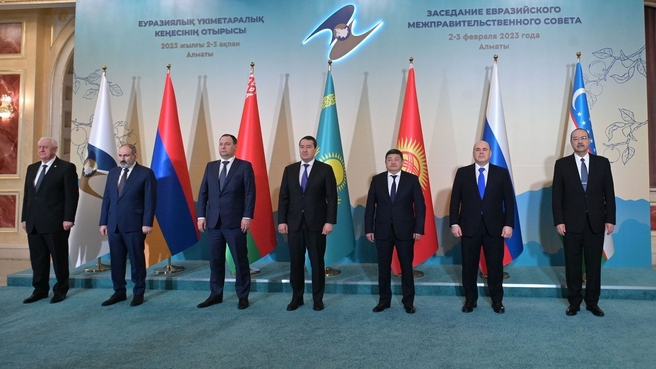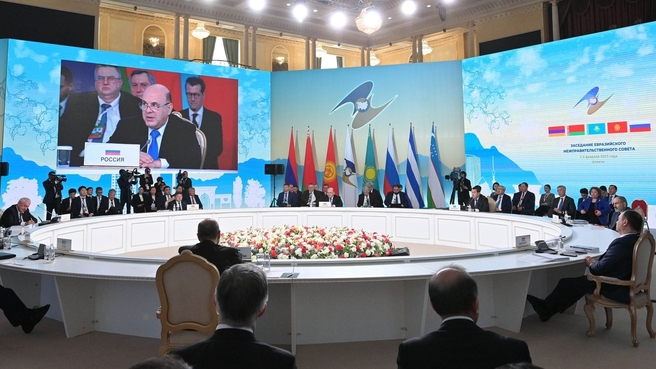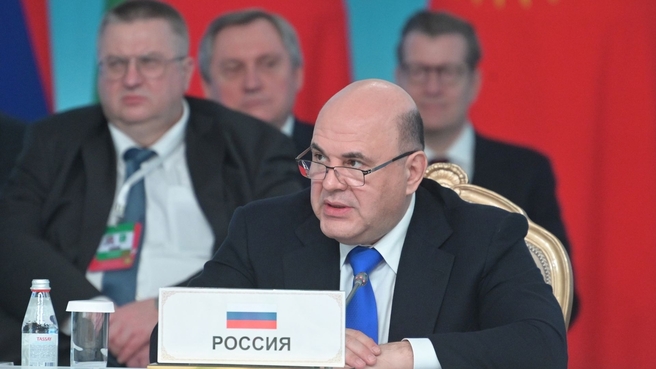The heads of delegations discussed topical issues of Eurasian integration, including the functioning of the EAEU internal market, financing industrial cooperation, developing the agricultural complex, as well as technical regulation and cooperation in the energy sector. Special attention was paid to the digital agenda, in particular, improving the union’s integrated information system.
Joint photo session of the heads of delegations taking part in the expanded meeting of the Eurasian Intergovernmental Council
Mikhail Mishustin’s remarks at the meeting
List of heads of delegations taking part in the expanded meeting of the Eurasian Intergovernmental Council:
Prime Minister of the Republic of Armenia Nikol Pashinyan;
Prime Minister of the Republic of Belarus Roman Golovchenko;
Prime Minister of the Republic of Kazakhstan Alikhan Smailov;
Prime Minister of the Kyrgyz Republic, Chief of Staff of the Presidential Executive Office of the Kyrgyz Republic Akylbek Japarov;
Prime Minister of the Russian Federation, Chair of the Eurasian Intergovernmental Council Mikhail Mishustin;
Prime Minister of the Republic of Cuba Manuel Marrero Cruz (via videoconference);
Prime Minister of the Republic of Uzbekistan Abdulla Aripov;
Chairman of the Eurasian Economic Commission Board Mikhail Myasnikovich;
Secretary-General of the Commonwealth of Independent States Sergei Lebedev.
Mr Smailov, friends, colleagues,
First, I would like to once again thank our Kazakhstani friends for the warm welcome at the first meeting of the Eurasian Intergovernmental Council this year and for the excellent organising of the Almaty Digital Forum, which we all just attended.
Yesterday, at our restricted-attendance meeting, we reviewed the most important issues on the integration agenda that determine our long-term work and reaffirmed our joint commitment to deepening our cooperation.
Here in the expanded meeting, I would like to greet the heads of government of the observer states that have joined us. We are looking forward to further active and constructive cooperation.
On 1 January, Russia assumed the chairmanship at the EAEU bodies from Kyrgyzstan. In his address to our countries’ leaders, President of Russia Vladimir Putin noted that the union had every opportunity to become one of the powerful, independent, self-sufficient poles of the emerging multipolar world, and to be the centre of attraction for all independent, sovereign states that share our values and are looking for cooperation.
We aim to continue a dynamic and productive dialogue. Together we must do everything necessary to strengthen integration across the board, including the political, economic, industrial, financial, and technological areas. The quality of life of our people and our countries’ future largely depends on this.
The situation in the global economy is changing rapidly. The attempts of the collective West to impose its hegemony have already resulted in the disruption of the traditional trade ties and transport and logistics chains. Food security problems have intensified, hitting millions of people hardest in the less developed countries.
Of course, the current processes have also affected the EAEU due to its high interconnection with the international economic system, However, the negative forecasts regarding the stability of our union did not come true.
Throughout January to November last year, the decline in gross domestic product was only 1.2 percent. At the same time, industrial production remained at almost the same level as the year before, exceeding $1.5 trillion.
We had positive momentum in a number of key areas. The output of agricultural products increased by more than 5 percent, and construction volumes increased 5.5 percent. We also see a very good pace in the mining industry, as well as investment in fixed assets.
Unemployment indicators serve as a significant indicator of the state of the union’s economy. According to the results of last November, it dropped 18 percent.
All this has been achieved thanks to joint steps to level the consequences of the sanctions pressure on the individual countries of the five union members, among other things. This work should be continued, primarily as part of the implementation of the list of measures to improve the sustainability of the EAEU economies.
In preparing the priorities for its chairmanship of the union’s governing bodies, Russia considered the evolving international economic situation and the aggravated geopolitical environment. In this regard, President Vladimir Putin identified the drafting of new long-term planning documents as one of the priorities. These documents should define the main vectors of joint integration activity until the end of 2030 and 2045.
The Eurasian Economic Commission has presented a report on the implementation of previously reached agreements, including the Strategic Development Guidelines for Eurasian Economic Integration until 2025. Colleagues, a lot of work has been done, but now we have new goals and tasks.
We need to respond promptly and outline the contours of further cooperation. And I ask the commission to organise our work accordingly.
It is important to lay a solid foundation for unlocking the technological potential of our countries as quickly as possible. We have spoken at length about this at the forum today. We need to combine our efforts to introduce advanced scientific and technological solutions into leading sectors of the economy. I am talking about the automotive, chemical, transport, agricultural equipment-building, microelectronics, aircraft and ship building, pharmaceuticals, alternative energy, and biotechnology industries.
This collaboration should be carried out both by ministries and departments, by research institutes and our expert community.
We need to create production using our own innovative groundwork and resources, and do it taking into account the best international practices. Particular attention, of course, should be paid to personnel training.
We have good prospects for integration on the digital track. Today, as I said, we discussed this in detail at the Digital Almaty International Forum, and I would like to thank my colleagues once again for showing excellent examples of applications, including on integration, which can be used by all of our member countries.
The Digital Almaty Forum brings together world-class experts and allows us to learn about cutting-edge developments.
We all agree that one of the challenges we face is to achieve independence, true sovereignty from foreign solutions. Any digital transformation must be driven by our own technology, based on common principles. I propose that we work out such approaches together and adopt them at the Eurasian Intergovernmental Council level.
I urge our colleagues to actively develop cooperation within the EAEU integrated information system and to set up data exchanges between authorised agencies on this single platform.
The implementation of common digital solutions in a wide range of areas is also extremely relevant. We have talked about this in detail. I also ask the commission to keep this issue under control, not to allow the launch of these projects to be postponed. The related Russian ministries have received the necessary instructions from the Government.
In the current circumstances, opening joint high-tech production facilities is of particular importance. At the last meeting of the Supreme Eurasian Economic Council in December, our presidents agreed to create a new mechanism for the preferential financing of industrial cooperation. We also discussed this at the restricted-attendance meeting yesterday. This will support breakthrough multilateral projects with funding from the union budget. This is necessary to ensure the technological sovereignty of the five EAEU member states. We need to make such assistance available to our companies as soon as possible, and to involve development institutions more actively in this work.
Improving food security is another important area of focus. As President Putin noted, our countries boast a strong agro-industrial base that allows them to provide themselves dependably with the necessary agricultural products and to export food in significant volumes.
Clearly, we should use our advantages more productively. The Eurasian Agroexpress project has a good track record. We started it one year ago. The aggregate volume of exports exceeded 500,000 tonnes, which is significantly more than planned.
That includes meat, dairy and fat and oil products, as well as fruit and vegetables. A huge fleet of specialised refrigerated containers has been procured. Container trains depart daily.
We are seeing the demand overseas grow. Based on the successful pilot shipping plans, we support the expansion of the project in the North-South corridor countries, primarily Iran, India, the United Arab Emirates and Turkmenistan. We are also willing to cooperate on building efficient logistics routes towards China.
Modern, fast and sustainable channels, and supply chains, are a strong incentive for the agriculture sector in our countries and a significant contribution to global food security.
Work in this area will be among the priorities of the Russian chairmanship of the union this year.
Separately, I would like to discuss self-sufficiency in terms of resources.
We consider it necessary to continue to form common energy markets while simultaneously promoting the green climate agenda.
Russia boasts advanced technology and experience in the use of nuclear energy for peaceful purposes. We are ready to share best practices and to help our partners.
Like the rest of the world, the Eurasian Five countries are impacted by negative climate change. Therefore, it is critical to join forces and harmonise our approaches to carbon regulation and to financing climate projects and to expedite the spread of the latest low-carbon technology, which is what we must do if we want to ensure sustainable economic growth and the well-being of our people.
Expanding cooperation in the financial and fiscal spheres is another priority. This concerns increasing the share of mutual transactions in national currencies and expanding the use of our proprietary payment systems. This is the only way to level the playing field for our companies, to create a favourable environment for investors, and to remove barriers in the union’s domestic market.
Special attention should be paid to ensuring the simplification and convergence of administrative procedures for businesses and to increasing guarantees for the protection of their rights.
Colleagues,
The Eurasian Economic Union is open to cooperation with all countries. We are building a productive dialogue with our partners under trade and economic agreements. Talks on free trade agreements with Iran and Egypt are ongoing. As a follow-up to the decisions of the heads of state, the first rounds of consultations with Indonesia and the United Arab Emirates are scheduled to be held soon. Cooperation with the countries of the Asia-Pacific region, the Middle East, Latin America and Africa is expanding.
We believe it is important to continue to expand ties between the two leading organisations in our economic region, namely, the Eurasian Economic Union and the Commonwealth of Independent States. In this regard, the signing of an action plan for interaction between the executive bodies of the EAEU and the CIS for a three-year period is particularly important. Joint work with our partners in the Commonwealth of Independent States is, of course, an absolute priority.
Colleagues,
As part of Russia’s chairmanship, we plan to focus on all topics without exception. We are also open to new topics, should member countries or observers have any to propose.
We need to ensure the dynamic development of the union, the free movement of capital, labour, services and goods.
We will continue to work for the benefit of the people of our countries.
I would like to invite you to continue our discussion of the most important issues of integration this summer in Sochi. In early June, we will hold meetings of the CIS Council of Heads of Government, the Eurasian Intergovernmental Council and the international exhibition of cooperation projects ‘Eurasia is Our Home’, the Eurasian Congress and the Youth Forum of the CIS and the EAEU. We encourage our partners from regional associations, officials from the countries with which we have free trade agreements, and friendly states that seek to expand cooperation with our union to participate.
Documents signed following the Eurasian Intergovernmental Council meeting:
- Directive on the Macroeconomic Situation in the Member States of the Eurasian Economic Union and Proposals to Ensure Sustainable Economic Development
- Decision on Amending Regulations on Developing, Financing and Implementing Interstate Programmes and Projects in the Industrial Sphere
- Directive on Amending the List of Goods for which Indicative Balance Sheets are Drawn Up
- Decision on Approving the Rules for Access to Services for the Interstate Transmission of Electric Energy (Capacity) within the Framework of the Common Electric Power Market of the Eurasian Economic Union
- Directive on Amending Directive No. 11 of the Eurasian Intergovernmental Council dated June 21, 2022
- Directive on the Further Development of the Integrated Information System and the Digital Agenda of the Eurasian Economic Union
- Directive on Progress in Implementing the Eurasian Agroexpress Joint Project of the Member States of the Eurasian Economic Union for the Implementation of Expedited Rail and the Multimodal Transport of Agricultural Products and Food
- Directive on the Time and Place of the Next Meeting of the Eurasian Intergovernmental Council
- 2023-2025 Action Plan for Implementing the Memorandum on Expanding Interaction between the Eurasian Economic Commission and the Executive Committee of the Commonwealth of Independent States















